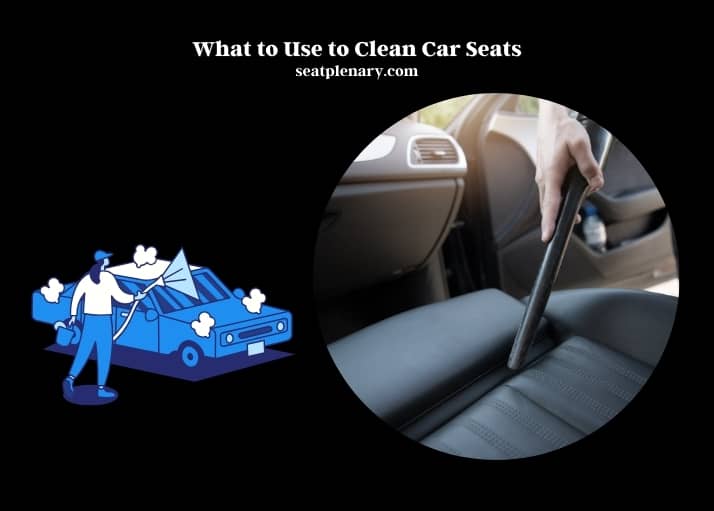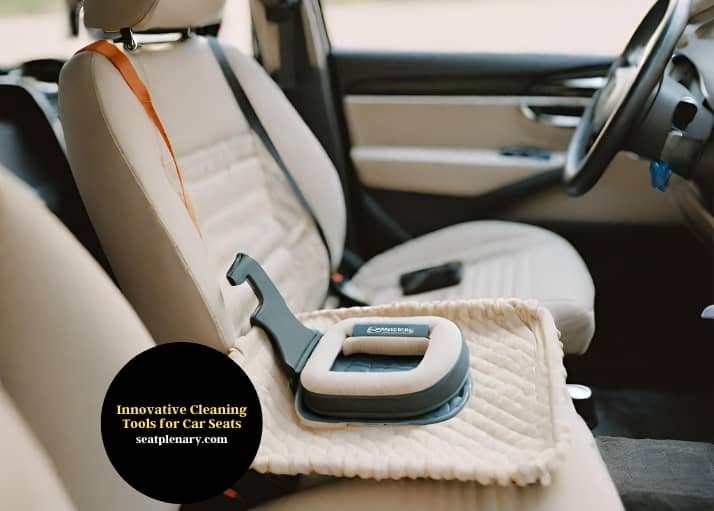To clean car seats effectively, it’s essential to use the right materials. Fabric seats benefit from gentle, fabric-friendly cleaners, while leather seats require specialized leather cleaners.
Maintaining the cleanliness of car seats is not just about aesthetic appeal; it’s also about preserving the material and ensuring a hygienic environment inside your vehicle. For fabric seats, a combination of vacuuming, spot cleaning with suitable stain removers, and occasional deep cleaning with upholstery cleaners works best. It’s crucial to use products that are tough on stains but gentle on the fabric to avoid damage.
Leather seats, on the other hand, demand a different approach. Regular use of leather conditioners and cleaners specifically designed for automotive leather is necessary to keep the seats supple and prevent cracking.

In the realm of natural cleaning solutions, DIY mixtures like vinegar and water for fabric seats, and a mild soap solution for leather, can be effective for light cleaning and deodorizing. However, for tougher stains or deep cleaning, commercial products specifically formulated for car upholstery should be used.
Considering the frequency of cleaning is important. Regular cleaning not only maintains the appearance of the seats but also extends their lifespan. By choosing the right cleaning agents and methods, you can keep your car’s interior looking and feeling fresh.
Optimal Cleaners for Car Seats: A Comprehensive Guide
Choosing the right materials and products for cleaning car seats is crucial for maintaining their appearance and longevity. Different seat materials require specific cleaning agents to prevent damage. For fabric seats, gentle, fabric-friendly cleaners are essential. They should remove stains without harming the fabric’s integrity. In contrast, leather seats demand specialized cleaners that clean without drying out or cracking the leather. Natural cleaners are gaining popularity due to their environmental friendliness and safety, especially for those with allergies or sensitivities to chemicals.
Their effectiveness varies, and they may not always provide the deep clean of chemical cleaners. Safety is another key consideration. Products should be non-toxic, especially for those with children or pets. The effectiveness of a cleaner is its ability to remove stains and odors without damaging the seat material.
Comparison of Cleaning Products for Car Seats
| Product Type | Fabric Suitability | Leather Suitability | Safety | Effectiveness |
| Natural | High | Moderate | High | Moderate |
| Chemical | Moderate | High | Moderate | High |
Fabric Car Seat Cleaning: A Detailed Approach
Cleaning fabric car seats involves several steps to ensure thoroughness without damaging the material. Start by vacuuming the seats to remove loose dirt and debris. This prevents dirt from becoming embedded in the fabric during the wet cleaning process. Next, tackle stains using a suitable stain remover. It’s important to test the product on a small, inconspicuous area first to ensure it doesn’t discolor the fabric.
After applying the stain remover, gently scrub the area and then wipe away the cleaner with a damp cloth. The drying process is critical; seats should be allowed to air dry completely to prevent mold or mildew growth. Regular cleaning maintains the appearance and longevity of the seats, while DIY solutions like a mixture of vinegar and water can be effective for light cleaning and deodorizing.
Leather Car Seat Care: Advanced Strategies
Leather car seats require a different approach. Regular conditioning is vital to keep the leather supple and prevent cracking. Use a conditioner specifically designed for automotive leather. Avoiding damage is also key. Harsh chemicals or abrasive tools can scratch or dry out the leather. Specialized products designed for leather care are recommended.
These products clean while preserving the leather’s natural oils. Seeking professional advice can be beneficial, especially for high-end or delicate leather. Long-term care strategies include regular cleaning and conditioning, avoiding prolonged exposure to sunlight, and immediate cleaning of spills to prevent staining.
DIY vs Professional Car Seat Cleaning: A Comparative Analysis
Deciding between DIY and professional car seat cleaning depends on various factors. DIY methods are more cost-effective and can be done at one’s convenience. However, they may not achieve the same level of cleanliness as professional services. Professional cleaning, while more expensive, often results in a deeper clean and can extend the life of the car seats.
Time investment is another consideration. DIY cleaning can be time-consuming, especially for those unfamiliar with the process. Professional services offer convenience but at a higher cost.
DIY vs Professional Cleaning Cost-Benefit Analysis
| Factor | DIY Cleaning | Professional Cleaning |
| Cost | Low | High |
| Time Investment | High | Low |
| Quality of Results | Moderate | High |
| Convenience | Moderate | High |
Innovative Cleaning Tools for Car Seats
The market offers a range of innovative tools and gadgets for car seat cleaning. These tools are designed to make the cleaning process more efficient and less labor-intensive. Latest cleaning technologies include high-powered vacuums and steam cleaners that can remove deep-seated dirt and stains. User reviews are a valuable resource for determining the effectiveness and ease of use of these tools.
Ergonomic designs ensure comfort during cleaning, which is particularly beneficial for those who clean regularly. Cost-effectiveness is a key factor; while some tools may be more expensive, their efficiency and durability can offer better value in the long run. Availability varies, with some tools readily available at automotive or general retailers, while others may be more specialized.

FAQs
Can Baby Wipes Be Used on Car Seats?
Using baby wipes on car seats is a common query. While baby wipes are gentle and convenient, they may not be the best choice for cleaning car seats. They are designed for sensitive skin and may not effectively remove tough stains or built-up grime.
The moisture in baby wipes can seep into the seat material, potentially causing damage over time. For light cleaning, they can be useful, but for more thorough jobs, specialized car seat cleaners are recommended.
What Cleaning Solution Can I Use to Remove Wetness from My Car Seats?
When dealing with common causes of wet seats, it’s important to use a suitable cleaning solution. For leather seats, a gentle leather cleaner can effectively remove wetness without causing damage. For fabric seats, a mixture of water and mild detergent can help blot and lift the moisture.
What is the Best Product for Cleaning Car Seats, Particularly White Seats?
When it comes to cleaning car seats, particularly clean white Tesla seats, it’s important to choose a product that is gentle yet effective. A popular choice is a pH-balanced leather cleaner that can safely remove dirt and stains without damaging the delicate white upholstery.
Is Vinegar Safe for Cleaning Car Seats?
Vinegar is a popular DIY cleaning solution due to its natural disinfectant properties. It’s safe for use on most car seat materials, including fabric and leather. For fabric seats, a solution of vinegar and water can help remove stains and odors. On leather seats, it’s advisable to dilute the vinegar more to prevent any potential damage. Always test on a small area first to ensure it doesn’t affect the color or texture of the material.
Can I Use the Zippers on Honda Fit Seat Backs to Clean the Car Seats?
Yes, the honda fit seat design allows for easy removal and cleaning of the car seats. You can utilize the zippers on the seat backs to conveniently remove the covers for washing. This feature makes it simple to maintain the cleanliness and freshness of your Honda Fit’s interior.
Are Steam Cleaners Effective for Car Seats?
Steam cleaners are an effective tool for cleaning car seats. They use hot steam to loosen dirt and stains, making them easier to wipe away. This method is particularly useful for fabric seats, as it penetrates deep into the fibers. For leather seats, caution is advised as excessive moisture and heat can damage the leather. Always follow the manufacturer’s instructions and use a steam cleaner specifically designed for automotive interiors.
Can Baking Soda Be Used to Clean Car Seats?
Baking soda is an effective, natural cleaning agent for car seats. It’s especially good at absorbing odors and lifting light stains. Sprinkle baking soda on the seats, let it sit for a few hours, then vacuum it up. For tougher stains, make a paste with water and apply it to the stain. After a few minutes, gently scrub and wipe away. This method works well for both fabric and leather seats, but always test on a small area first.
Is It Safe to Use Alcohol-Based Cleaners on Car Seats?
Alcohol-based cleaners can be used on car seats, but with caution. They are effective at sanitizing and removing tough stains.
They can be harsh on certain materials. For leather seats, alcohol can dry out and crack the leather over time. For fabric seats, there’s less risk, but it’s still important to use a diluted solution and test it on a small area first. In general, alcohol-based cleaners should be used sparingly and only when necessary.
How Often Should Car Seats Be Cleaned?
The frequency of cleaning car seats depends on usage and exposure to dirt. As a general rule, a thorough cleaning every three to six months is recommended. However, if you have children, pets, or frequently eat in your car, more frequent cleaning may be necessary. Regular vacuuming and spot cleaning can help maintain the cleanliness and appearance of the seats between deeper cleans. Keeping a routine ensures longevity and hygiene of the car’s interior.
Summary
Maintaining clean car seats is essential for both aesthetics and longevity. The choice of cleaning materials and methods varies depending on the seat material—fabric or leather. While DIY methods are cost-effective and convenient, professional cleaning offers a deeper clean. Innovative tools and gadgets can further ease the cleaning process. Regular maintenance, using the right products and techniques, ensures that car seats remain in excellent condition.
